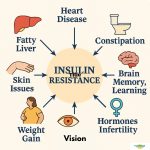As a nutritionist, I continually stress the significance of maintaining a balanced diet to enhance your health and overall well-being. Your dietary choices directly impact your health and quality of life. A balanced diet supplies your body with vital nutrients for optimal functioning.

This blog post discusses the critical components of a balanced diet and the benefits of eating healthy.
A balanced diet should encompass an adequate intake of vitamins and minerals in addition to macronutrients. Fruits and vegetables are rich sources of essential nutrients, making it imperative to include a diverse range of produce to meet your body's nutritional needs.
What is a good diet?
A balanced diet includes a variety of foods, including macro and micronutrients and essential fats, to ensure that your body is getting a wide range of healthy nutrients.
Macronutrients are the nutrients that provide your body with energy and structure. They are essential for overall health and well-being. The 3 main macronutrients are:
- Carbohydrates are the body's primary energy source, so they're crucial to a balanced diet. Complex carbohydrates, such as whole grains, beans, legumes, fruits, and vegetables, provide natural sugar for energy and fiber.
- Proteins are essential for tissue growth and repair in the body. Including lean protein sources such as poultry, fish, tofu, legumes, nuts, seaweeds, and dairy products in your meals ensures that your body's protein requirements are met. Protein also contributes to immune function, muscle maintenance, and bone strength, making it indispensable in a balanced diet.
- While fats are often misunderstood, they're essential when chosen wisely. Prioritizing healthy fats found in nuts, seeds, avocados, and olive oil is crucial as they promote overall health. Conversely, it's vital to avoid the intake of unhealthy fats such as trans fats and limit saturated fats, which can have detrimental effects on health when consumed excessively.
Micronutrients are essential nutrients that your body needs in smaller quantities than macronutrients. While they don't provide energy, they play crucial roles in various bodily functions. Below are 3 main categories of micronutrients.
- Vitamins are organic compounds that help regulate various bodily processes. They're found in a wide variety of foods, including fruits, vegetables, nuts, seeds, algae, whole grains, and lean proteins.
- Minerals are inorganic elements that are essential for various bodily functions. They're also found in a wide variety of foods.
- Phytonutrients are plant-based compounds that have various health benefits. Examples include antioxidants, phytoestrogens, carotenoids, and polyphenols. Phytonutrients can help reduce the risk of chronic diseases like heart disease, cancer, and stroke.
Essential fats are a type of healthy fat that your body cannot produce on its own. They must be obtained from our diet. These fats play crucial roles, including energy, cell structure, brain health, inflammation, and hormone production.
Omega-3 and omega-6 fatty acids are the 2 main types of essential fats. They're found in fatty fish, seaweed, flaxseeds, chia seeds, walnuts, and vegetable oils. For optimal health, it's crucial to balance the intake of Omega fatty acids.
Saturated fat
Micronutrients and essential fats work together with macronutrients to support overall health and well-being. Deficiencies in micronutrients can lead to various health problems.
Hydration in a balanced diet
Hydration is another critical aspect of a balanced diet. Consuming adequate water is necessary to maintain optimum body functions. Staying hydrated is essential for regulating body temperature, digestion, nutrient transportation, and overall cellular function. As a rule of thumb, aim to drink at least eight glasses of water per day to ensure adequate hydration.
The benefits of a balanced diet
Consuming a balanced diet comes with numerous health benefits, such as:
- Weight management: A balanced diet can help you maintain a healthy weight by providing the right amount of calories and nutrients.
- Increased energy: Eating the right food will energize you throughout the day by providing your body with the fuel it needs.
- Improved mood: Studies have shown that a healthy diet can positively impact mood and mental health.
- Reduced risk of chronic diseases: Eating a balanced diet can help reduce your risk of developing chronic diseases such as heart disease, stroke, type 2 diabetes, and certain types of cancer.
- Enhanced immune system: A healthy diet provides your body with essential nutrients to fight off infections and support healing.
Practical tips for achieving a balanced diet
Here are some practical tips to help you incorporate a balanced diet into your daily life:
- Plan your meals: Planning your meals and snacks in advance can help you make healthier choices and avoid impulsive eating.
- Cook at home: Cooking at home gives you more control over your food quality.
- Eat a variety of foods: In addition to classic macronutrients, aim to include new fruits and vegetables, as well as more legumes like lentils and beans.
- Avoid processed foods: Processed foods often contain unhealthy fats, added sugars, sodium, and additives.
- Stay hydrated: Drink plenty of water throughout the day.
- Listen to your body: Pay attention to your hunger and fullness cues.
It's important to acknowledge that your nutritional needs can vary based on factors such as your age, sex, activity level, and underlying health conditions.

Conclusion
A balanced diet integrates a variety of foods to supply your body with the necessary nutrients for optimal health.
By prioritizing whole, minimally processed foods and being mindful of the quality of food, you can work towards achieving a balanced and nutritious diet that supports your overall health.
Making conscious food choices is a potent way to stay healthy and increase your life span.
Remember, You've the power to heal yourself, Githu.


















Comments
No Comments